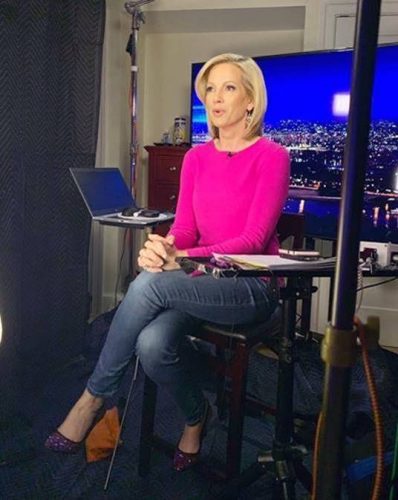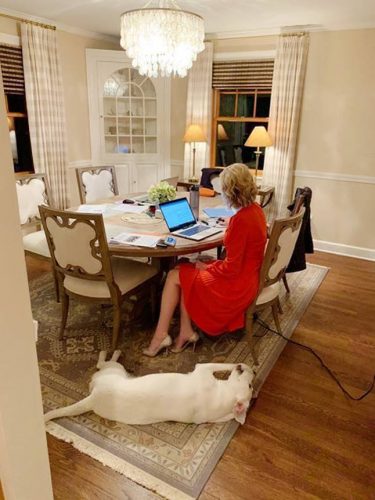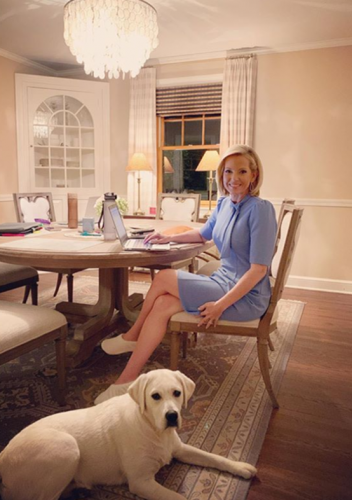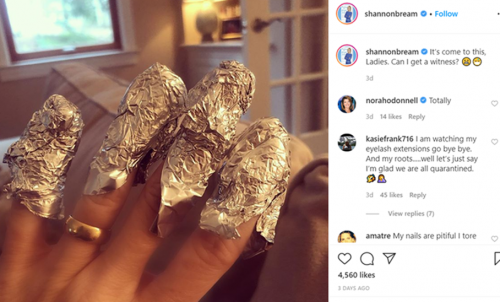Fox News Anchor Shannon Bream Pivots to a “Very, Very Scaled Down” National Newscast At Home in Arlington … and is Kind of Loving it

Bream’s at-home set up of her nightly broadcast “Fox News @ Night with Shannon Bream”
As some states start to re-open, and other states remain on lockdown, Fox News @ Night anchor Shannon Bream is covering the ever-evolving pandemic with her guests live from her home “studio” in Arlington, Va. (a.k.a her extra guest bedroom). The challenges of live TV are considerable — no production team, limited hair and makeup help, a one-year-old labrador puppy begging for attention, and her husband in the other room.
To get set up remotely at home for a live newscast, she had to move out end tables and lamps on the sides of the guest bed and then push the bed up against a wall. She also has thick moving blankets “hung up all over the place” to control the sound. But Bream, who also serves as a Chief Legal Correspondent for the network and hosts her own podcast “Livin’ the Bream” on Fox News Radio, is taking it in stride, even “embracing the chance to be at home as much as possible.”
Since the COVID-19 outbreak, Bream has continued hosting Fox News @ Night with Shannon Bream each weeknight from 11 PM to12AM/ET in what she describes as a “very, very scaled down” newscast. But it’s working. More than that, Bream is staying upbeat. During her days, she’s continuing to read and research, keep a normal workout schedule, meet with colleagues via Zoom, and is spending time talking with loved ones. Her current mantra, “let’s slow down and count our blessings.”
We caught up with her via email to ask more about strategies for working from home, take-aways from health care experts she has recently spoken with (“give yourself grace to process and deal with your new reality,” she says); the endless inspirational good news stories that she closes with each night, and that very human craving for long hugs.
Washington Life: What has been key to successfully working from home, especially with your husband and new puppy?
Bream: In reality, I’m a homebody, so I think the adjustment has been easier for me than most. Some days I feel guilty about that, but I’m embracing the chance to be at home as much as possible. I feel for my friends who are extroverts and find this to be very challenging. What I need to get better at is setting boundaries. I love what I do and I start reading and researching before lunchtime, even though we aren’t on until 11p ET. Then I have Zoom meetings throughout the day, and what has become the 5PM or 6PM appointment viewing: the briefing. I’m trying to carve out more non-work activities during the day. There’s plenty of walking Biscuit Bream (our almost 1-year-old lab) and I’m trying to set aside time to read non-work things I haven’t had time for. We’re also keeping up our normal workout schedule, even if that means taking a speaker out into the driveway and doing it there. People who drive by often give us a honk and a smile.

Bream working from home with her trusty colleague, Biscuit Bream!
WL: Describe the process of how Fox News transitioned with you to a live home newscast.
Bream: It’s actually been amazing to me how quickly Fox pivoted. Very early on we started the process of transitioning a significant portion of our staff to working from home. It only took a day or two to get a remote studio up and running in one of our guest rooms.
It’s a very, very scaled-down version of anything we’d do live in the studio – but we’re making it work! Our cameraman is the same person every night, and he gets everything dialed in and ready to go before I walk into the room and take my seat. I enjoy the Zoom meetings with my team because we can see each other and stay connected not only professionally, but personally. I love seeing their faces and getting the real lowdown on how they’re managing. Everyone has risen to the occasion, and I’m impressed at how well it’s come together remotely.

All ready to go! Shannon and Biscuit Bream prepared for the evening broadcast – Slippers allowed!
WL: Unlike the rest of us, you can’t get away with being in pajamas without makeup all day while working remotely. Feelings on that? Have any self-care tips to share to feel “normal?”
Bream: I’m not gonna lie. There are days that I’m still in my robe when the afternoon/evening briefing starts. I don’t feel too guilty, since I have a late night shift.
I’m one of those folks who goes in to work at the office without make up on. I do all my meetings that way, and don’t get glammed up until closer to our broadcast time. So, I guess that hasn’t changed! I do think whether you’ve suddenly been turned into a homeschooling parent and/or you’re trying to work from home or you’re suddenly unemployed it’s very important to give yourself a lot of leeway. Just about everyone I know has been on an emotional roller coaster. Very few things feel “normal” right now.

Bream shared an Instagram (@Shannonbream) of her self-care, quarantine style!
WL: You’ve recently had special guests, including author John Eldredge and physician Dr. Nicole Saphier, on your podcast who explained the effects of CV19 and how experts and doctors continue to fight the virus. What are your biggest takeaways from conversations like these and more that you’d like people to know?
Bream: They and others have given so much good advice. Give yourself grace to process and deal with your new reality. We’re not sure when things may ever return to life as we knew it before COVID19. However, I’m not sure I want that to happen … exactly. Along with the real struggles, there are some positive developments I’d hope we keep. We’re talking to our neighbors and dropping off non-contact goodies for each other in a way we never have before. Turns out a couple of our neighbors are excellent bakers and very generous! I think we’ve all be inspired to look for ways we can help others, so let’s hold on to that part of it. Let’s spend more time talking with our loved ones, even if it’s long-distance. Let’s slow down and count our blessings.
In addition to this I had the chance to lead a virtual discussion with two retired four-star admirals, Bill McRaven and Jim Stavridis, who really gave me a shot in the arm. They talked about the importance of coming up with a daily schedule for yourself, some sort of routine to give you structure. It doesn’t have to fit anyone else’s idea about what you should be doing, just a framework for your day that makes you feel grounded. And look for ways to serve others where there are growing needs.
WL: How do you cope with covering news that might feel overwhelming to many?
Bream: Early on, before most of the country realized what was coming, I’d heard enough from experts (on camera and off) about the reality of how COVID19 would impact America. I think it was hard for people to imagine at that point, and I felt a bit overwhelmed – like I was waiting for a tidal wave that most people on the beach couldn’t see yet.
I had a few tears in the shower and I went back to work. I also felt a deep emotional hit when our houses of worship were closed down.
I look forward to Sundays because they give me so much peace, sitting in the pew getting perspective and restoration. I firmly believe you can worship wherever you are, but I’m very much missing being together with fellow parishioners – sharing the burden.
I pray more than I probably ever have, and that’s how I start my day.
That may happen several times a day, when I hear about a new need or a fresh loss. It gives me comfort and a place to leave my burdens, so that I can do my job with joy and hope.
WL: Most inspirational or “good news” story you have covered during the pandemic?
Bream: The inspiring part of this is the endless flood of stories about people doing things to help others, often complete strangers. We reported on a newspaper delivery man who decided to send out hundreds of fliers to his customers, asking if any of them needed help getting groceries or items from the pharmacy. The response was so overwhelming that he’s ended up drafting 4 other family members to tackle the errands with him every day after he delivers his papers. One elderly lady said she was the closest thing to an angel she’d ever see. His family has now committed to continuing the service even after COVID19 calms down.
A friend of mine in Texas decided to organize younger, healthy people to do something very similar – delivering all kinds of food and necessities to not only older, at-risk folks but also to families suddenly struggling because of unexpected unemployment.
We put these as the closer to our show every night, and we never run out of examples!
WL: You published a book in 2019 called “Finding the Bright Side: The Art of Chasing What Matters,” which talks about finding purpose in life’s unpredictability. How do you find yourself finding the bright side in this unpredictable pandemic?
Bream: It’s all those things many of us didn’t make time for (or have time for) in the past: checking on a neighbor, financially supporting someone whose business you’ve frequented for years and now they’re on the ropes, taking walks in the fresh air, picking up the phone to talk with extended family members, more downtime to talk and think, personally thanking the delivery person as they leave packages on your doorstep, telling people how much you love and appreciate them – just because.
WL: What is your go-to advice for your viewers on how to keep a positive attitude during these unprecedented times? How has your faith guided you?
Bream: There’s no way to ignore the truth, people are suffering and they are worried. For me, my morning starts with praying, reading Scripture and journaling. It’s not optional for me during this tragic time. It gives me such encouragement and it challenges me to look around for concrete ways that I can help.
We all have something or someone we can be thankful for. I reflect on dark times I’ve faced in the past and how my faith has guided me through. As a Christian, I believe God did not promise us life would be easy, but He did promise to walk through it with us. That gives me enormous comfort and reminds me that I’m never truly in control of life. That’s actually a relief to me. I don’t have what it takes to watch over the universe.
WL: Have any Washingtonians’ efforts to help the community stood out to you? Who/how?
Bream: I’ve seen so many examples, but let me focus on a personal friend. Bethany Mandel stepped up to create Kosher19, a very clever play on the name of the virus. She realized that people were being very generous, donating meals to health care workers, but often the food couldn’t be eaten by medical personnel who keep kosher. Bethany sent out a fundraising request and it blossomed very quickly.
Now she’s able to support kosher markets and food production outlets as they struggle to stay open AND hospital staff and medical personnel who are working around the clock and need kosher meal options.
WL: What do you think is the best way for Washingtonians to help their community?
Bream: Honestly, it doesn’t have to be anything formal. See if a neighbor needs grocery pick up or their lawn mowed.
There are numerous charitable groups in our area, like the coalition preparing meals using the facilities at Nats Park. It’s understandable that not everyone can make a donation right now, but there are places to safely volunteer – even online. Kids need virtual tutors and small business owners are looking for help wading through the paperwork they’ve got to complete for loan applications. If you have expertise and some extra time, make yourself available via the web.
WL: Complete this sentence… First thing I’m going to do/eat/buy/visit when we are let out of this quarantine is…..
Bream: It’s hilarious because my husband and I had this talk on our walk today. We’re both craving the meatballs at RPM Italian. But really I’m so looking forward to seeing my family and friends and giving them the longest hugs!




